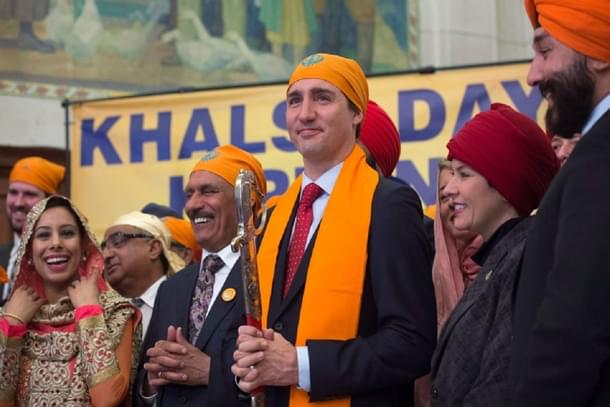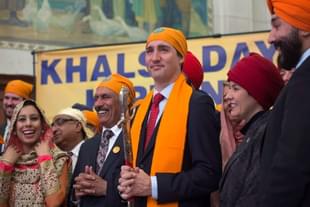World
Declining Ratings And Minority Government: Why Canadian PM Justin Trudeau Seeks Khalistani Support
Nayan Dwivedi
Sep 19, 2023, 01:32 PM | Updated 01:37 PM IST
Save & read from anywhere!
Bookmark stories for easy access on any device or the Swarajya app.


Prime Minister of Canada, Justin Trudeau, speaking in the Canadian parliament earlier today (19 September) described Khalistan Tiger Force chief Hardeep Singh Nijjar as a citizen of Canada.
Trudeau claimed that the security agencies of the country have been actively pursuing credible allegations of a potential link between Indian government agents and the murder of Nijjar.
Trudeau's remarks are being seen as an unprecedented blow to India-Canada relations. In the aftermath of Trudeau's remarks, the Canadian foreign minister announced the expulsion of an Indian diplomat. The move was soon reciprocated by India.
Amidst the diplomatic crisis, the question remains why Trudeau chose to make such a statement about an investigation that is yet to conclude.
The answer may lie in the domestic politics of Canada.
As Canadian Prime Minister Justin Trudeau grapples with declining popularity and a minority government, he faces the challenge of garnering support from various quarters to maintain his political standing.
As per a survey conducted by an agency, Trudeau is regarded as the worst prime minister of the past 55 years, by 30 per cent of Canadians.
The Angus Reid Institute, another Canadian research firm, put Trudeau’s disapproval rating this month at 63 per cent.
Trudeau had called for an early election in September 2021, pinning his hopes on a ‘successful’ pandemic response to secure a majority in the House of Commons.
However, the election results fell short of his expectations. The House of Commons has 338 seats, Trudeau's Liberal Party lost 20 seats, reducing its previous count of 177 to 157, while the opposition Conservative Party secured 121 seats.
The Bloc Quebecois won 32, the New Democratic Party (NDP) claimed 24, the Green Party secured three, and one independent candidate emerged victorious.
Although Trudeau's party secured more seats than the opposition, it was insufficient for him to form a majority government, resulting in a minority government scenario.
In this situation, it was Jagmeet Singh, the leader of the NDP, who played a pivotal role in government formation. Singh's NDP won 24 seats in the 2021 election, making it crucial for the survival of Trudeau's government.
Singh, who goes by the nickname 'Jimmy' Dhaliwal, has been increasingly vocal in his support for the Khalistani cause since 2019. Singh also criticised the Narendra Modi government during the farmers' agitation over the now-repealed three farm laws in India, earning him substantial attention and scrutiny.
The NDP leader's advocacy for the rights of pro-Khalistani activist Amritpal Singh and his calls for Trudeau's intervention in the Punjab police crackdown, further solidify his role as a prominent figure within the Khalistani movement in Canada.
This dependence on the NDP may explain Trudeau's cautious approach toward "known Khalistani supporter" Jagmeet Singh.
As Trudeau grapples with declining public approval and a precarious political landscape, his handling of sensitive issues like Khalistan, underscores the balancing act he faces in navigating Canadian politics.
Nayan Dwivedi is Staff Writer at Swarajya.





